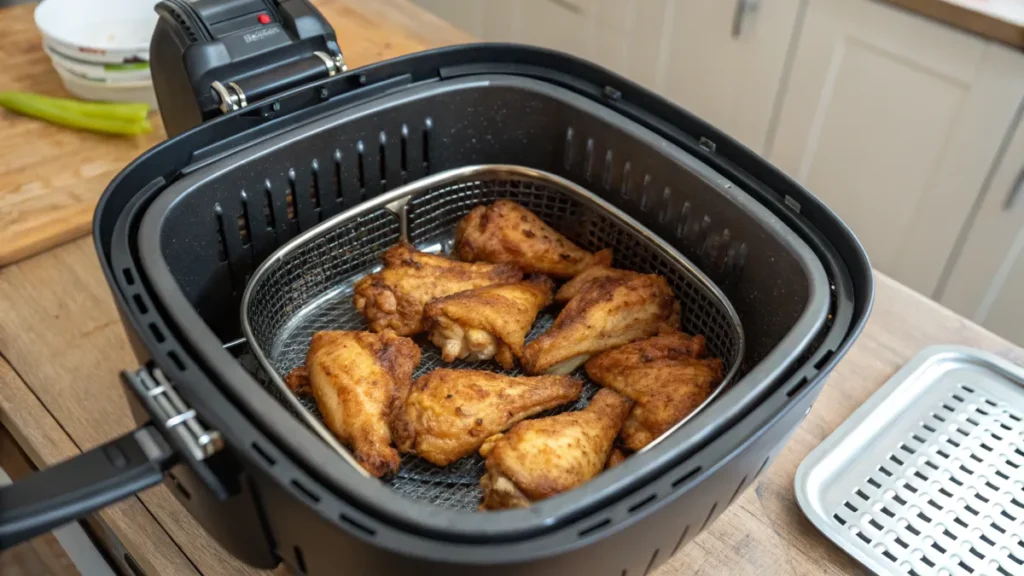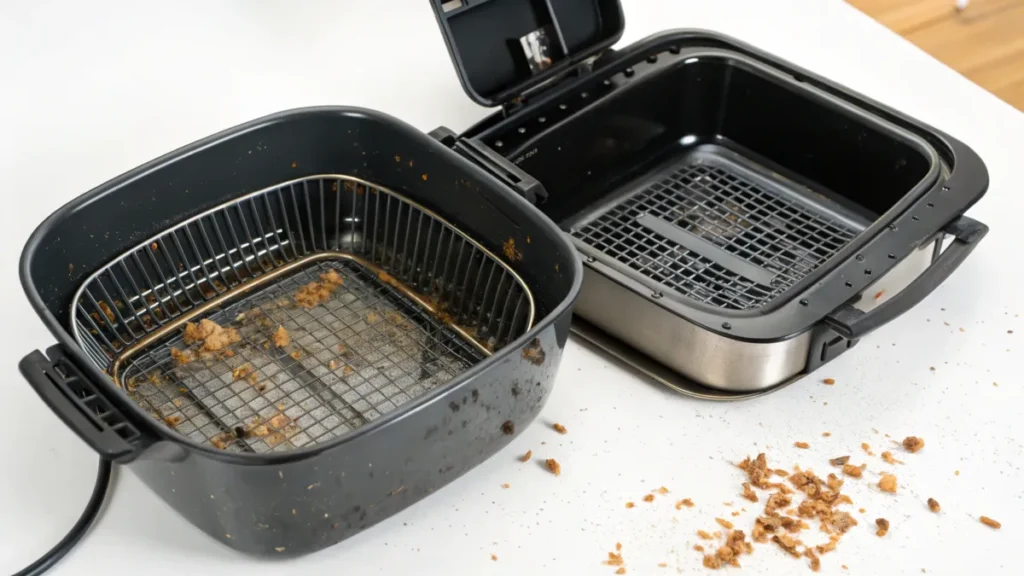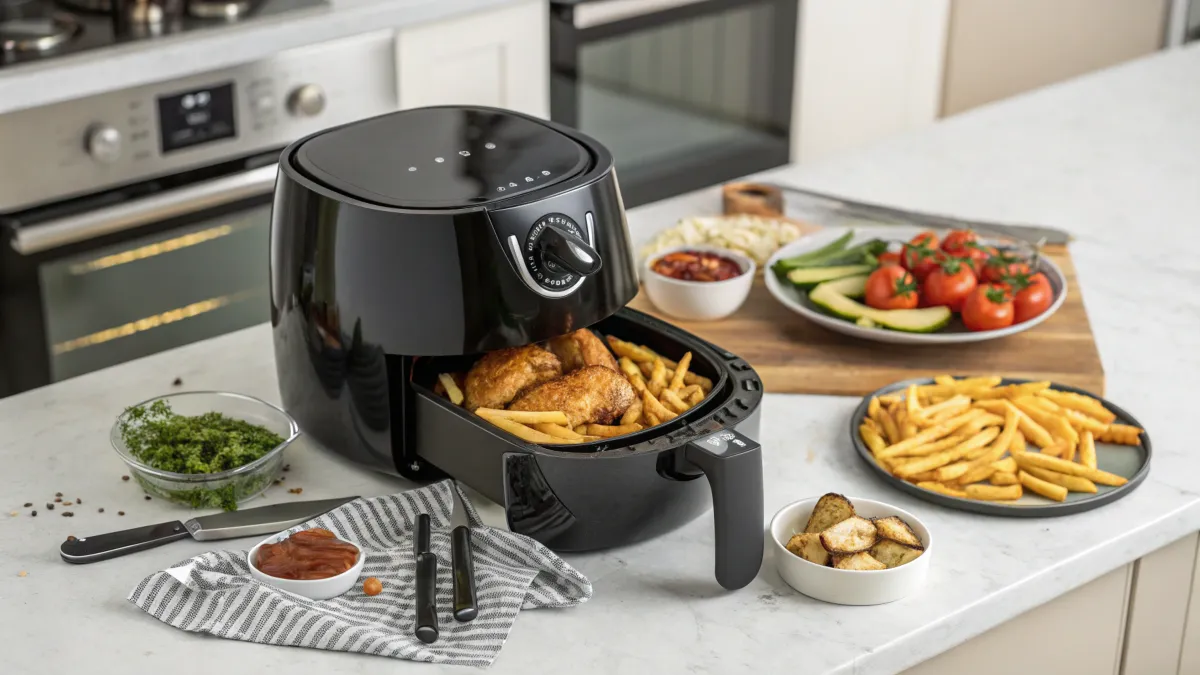Air fryers have become a staple in modern kitchens. They promise to deliver the taste and texture of fried foods with far less oil, making them a tempting alternative to traditional frying. But despite their popularity, air fryers come with a number of drawbacks that often get overlooked. In this article, we’ll dive deep into the Downside to Air Fryers, exploring their cooking limitations, health concerns, and practical challenges. By the end, you’ll have all the information you need to decide if an air fryer truly belongs in your kitchen.
Table of Contents
Introduction to Air Fryers
What Are Air Fryers?
Air fryers are compact kitchen appliances designed to cook food by circulating hot air around it, mimicking the effects of deep frying with very little oil. They’ve gained popularity for their efficiency and ability to produce crispy food with fewer calories and fat. Many households rely on them for quick and healthier meals. However, they aren’t the one-size-fits-all solution they’re often made out to be.
Why Discuss the Downsides?
While air fryers are marketed as a miracle appliance, they aren’t without flaws. From cooking inconsistencies to health concerns, the downsides to air fryers are worth considering. People often get swept up by the hype and overlook the practical and economic trade-offs. By understanding these drawbacks, you can make a more informed choice and avoid disappointment later on.
Air Fryers and Cooking Challenges
Limited Cooking Capacity

One of the major downsides to air fryers is their limited capacity. Most air fryers are designed to cook for small households. If you’re preparing a meal for a large family or hosting a dinner, the size can quickly become a problem. For instance, cooking a whole chicken or multiple servings of fries may require multiple batches, which takes extra time. This limitation can be particularly frustrating if you’re used to traditional ovens, which offer significantly more space for meal prep.
For more detailed cooking tips and advice, you can explore resources on Simply Recipes.
Uneven Cooking Issues
Air fryers work by circulating hot air, but they sometimes fail to cook food evenly. This can lead to hot spots, where parts of the food may get overcooked while others remain underdone. Foods like breaded chicken or dense vegetables are especially prone to uneven results. Stirring or flipping food during cooking can help, but this adds another layer of effort that detracts from the appliance’s appeal.
To troubleshoot uneven cooking, Serious Eats offers practical guidance.
Impact on Food Quality
Not a True Deep-Frying Replacement

Air fryers are often marketed as a healthier alternative to deep frying, but the results can fall short. The taste and texture of air-fried food simply don’t match the crispy, golden perfection achieved with traditional frying methods. Foods like battered fish or donuts, which depend on being submerged in oil, often come out dry or unevenly crisped in air fryers. If you’re craving the authentic experience of deep-fried food, an air fryer may leave you disappointed.
Dryness in Food
Another downside to air fryers is their tendency to dry out certain foods. While the hot air cooking method works well for crispy textures, it can make lean proteins like chicken breasts or pork chops lose their moisture. Overcooking is a common issue, especially for new users who are still learning the ropes. Adjusting cooking times and adding a light coat of oil can help, but it doesn’t fully resolve the problem.
Health Concerns
Formation of Harmful Chemicals
One critical downside to air fryers involves the potential creation of harmful chemicals when cooking at high temperatures. For example, studies have shown that cooking starchy foods like potatoes at high heat can lead to the formation of acrylamide, a chemical linked to certain health risks. While the amounts may not be significant in most cases, regular exposure could pose a concern over time. This risk increases if the food is overcooked or charred, a common mistake for new users.
Misconceptions About Healthy Eating
Air fryers are often marketed as a healthier alternative to traditional frying. While it’s true they use less oil, this doesn’t automatically make all air-fried foods healthy. Processed snacks, like frozen fries or breaded chicken, still contain high amounts of sodium and preservatives. Moreover, the crisping process can sometimes encourage overcooking, leading to nutrient loss. Balancing portion sizes and incorporating whole foods can help mitigate these issues, but the health benefits of air fryers are not as straightforward as they may seem.
for more information, check out Is an Air Fryer Good for Losing Weight?.
Practical Drawbacks
Cleaning Challenges

Cleaning is another downside to air fryers that users frequently encounter. While the baskets and trays are removable, their small crevices and perforated surfaces can trap grease and food particles. This makes cleaning more labor-intensive than you might expect. Some models are dishwasher-safe, but not all, so it’s important to check the manual before cleaning. Additionally, frequent cleaning is necessary to prevent buildup that could impact performance or taste.
Counter Space and Portability
Air fryers are not the most compact appliances. Many models take up a significant amount of counter space, which can be a problem in smaller kitchens. If you already have multiple appliances, fitting an air fryer into your workspace may feel overwhelming. Furthermore, their bulky design often makes them difficult to store away when not in use. If portability and storage matter to you, consider these factors before purchasing an air fryer.
Economic Considerations
Initial Cost of Purchase
Another downside to air fryers is their price. Compared to traditional cooking appliances, air fryers can be relatively expensive. Many high-quality models start at $100 and can go upwards of $300, depending on features and capacity. While there are budget-friendly options, they may lack durability or consistent performance. For families trying to manage their budgets, this initial cost might outweigh the potential benefits.
Operating Costs
In addition to the purchase price, operating an air fryer can come with hidden expenses. For instance, replacement parts like baskets or trays can be pricey if they wear out over time. Furthermore, air fryers often consume more electricity than other kitchen gadgets, particularly if used daily. These costs may not seem significant at first, but they can add up over the appliance’s lifespan.
Are Air Fryers Worth It? A Balanced Perspective
Pros of Using Air Fryers
Despite the downsides to air fryers, they still offer some benefits. Air fryers excel at quickly cooking small batches of food with minimal oil. This can be a healthier option for those watching their fat intake. Additionally, they are versatile and capable of preparing a wide range of dishes, from crispy fries to roasted vegetables. Their compact size also makes them convenient for single-serving meals or snacks.
Who Should Avoid Air Fryers?
However, air fryers aren’t suitable for everyone. If you have a large family or often cook big meals, their limited capacity could be frustrating. Similarly, those who prioritize traditional deep-fried flavors may find air-fried food underwhelming. People with small kitchens might also struggle to accommodate their bulky design. Weighing these factors carefully can help you decide if an air fryer meets your needs.
Economic Considerations
Initial Cost of Purchase
Another downside to air fryers is their price. Compared to traditional cooking appliances, air fryers can be relatively expensive. Many high-quality models start at $100 and can go upwards of $300, depending on features and capacity. While there are budget-friendly options, they may lack durability or consistent performance. For families trying to manage their budgets, this initial cost might outweigh the potential benefits.
Operating Costs
In addition to the purchase price, operating an air fryer can come with hidden expenses. For instance, replacement parts like baskets or trays can be pricey if they wear out over time. Furthermore, air fryers often consume more electricity than other kitchen gadgets, particularly if used daily. These costs may not seem significant at first, but they can add up over the appliance’s lifespan.
Are Air Fryers Worth It? A Balanced Perspective
Pros of Using Air Fryers
Despite the downsides to air fryers, they still offer some benefits. Air fryers excel at quickly cooking small batches of food with minimal oil. This can be a healthier option for those watching their fat intake. Additionally, they are versatile and capable of preparing a wide range of dishes, from crispy fries to roasted vegetables. Their compact size also makes them convenient for single-serving meals or snacks.
Who Should Avoid Air Fryers?
However, air fryers aren’t suitable for everyone. If you have a large family or often cook big meals, their limited capacity could be frustrating. Similarly, those who prioritize traditional deep-fried flavors may find air-fried food underwhelming. People with small kitchens might also struggle to accommodate their bulky design. Weighing these factors carefully can help you decide if an air fryer meets your needs.
FAQs About Air Fryers
What Are the Negative Effects of Air Fryers?
One common question is about the downside to air fryers and their potential negative effects. As discussed earlier, air fryers can produce harmful chemicals like acrylamide when cooking starchy foods at high temperatures. Additionally, they might dry out certain dishes, making them less appetizing. Cleaning challenges and limited cooking capacity are also frequent complaints from users.
Why Are People Getting Rid of Air Fryers?
Many people who purchase air fryers eventually stop using them or give them away. The reasons often include the bulkiness of the appliance and the inconvenience of cleaning. Furthermore, some users are disappointed with the taste and texture of air-fried foods, especially when comparing them to traditional deep frying. Over time, these issues can make the appliance less appealing.
What Cannot Be Cooked in an Air Fryer?
Air fryers are versatile, but they have their limits. Battered foods or items with a wet coating don’t cook well in air fryers, as the batter can drip off and create a mess. Similarly, delicate pastries and certain types of bread may not bake evenly. For a complete guide on this topic, consider researching reliable cooking sources to expand your knowledge.
Comparisons and Alternatives
Air Fryers vs. Ovens: Which Is Better?
When comparing air fryers to traditional ovens, there are pros and cons to both. Air fryers heat up faster and use less energy for small meals, making them great for quick snacks or reheating leftovers. However, ovens offer more space and versatility, especially for baking or preparing larger meals. If capacity and even cooking are your priorities, an oven may be the better choice.
Alternatives to Air Fryers
If the downside to air fryers outweighs their benefits, you might consider alternatives. Convection ovens work similarly by circulating hot air, but they can handle larger quantities. Pressure cookers and slow cookers are also excellent for different cooking styles. Each appliance has unique advantages, so choosing one depends on your specific needs and preferences.
Conclusion
Recap of Key Downsides
Air fryers have revolutionized the way we think about healthier cooking, but they aren’t without flaws. Throughout this article, we’ve explored the downside to air fryers, including limited cooking capacity, uneven results, potential health risks, and the challenge of cleaning. Their bulkiness and cost further add to the list of drawbacks. While air fryers offer convenience and efficiency, these downsides may influence whether they’re the right fit for your kitchen.
Making an Informed Choice
Before purchasing an air fryer, consider your cooking habits, kitchen space, and expectations. If you’re looking for an alternative to deep frying that’s quicker and uses less oil, an air fryer might be a great addition. However, if you cook for a large family or prioritize authentic fried textures, you may want to explore other options like convection ovens or traditional fryers. Making an informed choice ensures you’ll be happy with your decision in the long run.
For more cooking tips and advice, check out articles from trusted culinary sources. Happy cooking!

